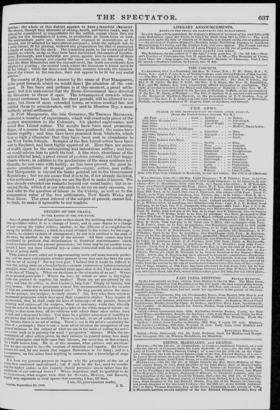DECLINE OF THE DRAMA.
TO THE EDITOR OF THE SPECTATOR.
Sin,--A great deal has of late been written about the declining state of the stage. One speculator refers it to a change of hours, and in some degree to a change of taste among the higher orders; another, to the diffusion of accomplishments among the middle classes; a third, to a want of talent in the writers for thestage ; a fourth, to vicious systems of management; by one it is ascribed to the state of the times, by another to the state of the saloons. All these causes may have contributed to produce that disinclination to theatrical entertainments which is said to characterize the present generation ; but there may he yet another cause (which I have not seen adverted to)—a cause connected with the condition of the art of acting itself.
While almost every other art is approximating more and more towards perfec- tion, mill its most enthusiastic admirer pretend to say that such has been the case with the art of acting ? For my own part, I believe that it would be difficult to show that acting rests on a broader basis—on more numerous or better-ascertained principles, now, than it did two hundred years ago—than it did, I had almost said,
in the days of 'fliespis. What are its claims to the character of an art? Where are its general principles ? Where the law's by which an actor in the higher walks can pretend to regulate his studies ? These are yet unexplored by the
actor; and how do critics, in their kindness, help him ? Simply by bidding him study nature. Do these gentlemen extend this recommendation to the votaries
of what are commonly termed kindred arts ? Do they gravely advise the musi- cian, the painter, the sculptor, to study nature ? No, they refer these artists to ascertained principles which bear upon their respective studies. They require of the musician, that he shall study the laws of harmony—of the painter, those of colouring and optics—of the sculptor, those of anatomy; while they liberally leave the actor to look for his guiding principles in the whole range of nature—in- cluding, as that term does, all the relations with which these other artists have
to deal, and a thousand besides. Can there be a plainer admission of inability to give advice that shall be available ? There is, in fact, no art of criticism for act- ing, because there is no art of acting. There is not in the actor's vocabulary the name of a principle; there is not a term which involves the recognition of any general relations in the subject of what we are in the habit of calling his art— Data term, such as in painting the word " perspective" denotes. While the no- menclatures of other artists prove, by their richness in general terms, how many available principles shed light upon their labours, the actor has, in that respect, but a blank before him. He is, at this moment, what painters and musicians have for ages ceased to be—the creature of imitation and impulse. He labours towards his end, by any means that suggest themselves to his fancy ; and as a consequence, no two actors have anything in common but a knowledge of stage business.
It is from my present purpose to inquire why the principles of the art of acting have remained undeveloped ; but if such be the fact, need we wonder that the higher orders in this country should patronise music rather than the echibitions of our national drama ? When tragedians shall be qualified to do fOrSIIAKSPEARE, what singers have done for HANDEL, MOZART, and Ross's!, tragedy may supersede or rival opera—but scarcely, I fear, till then. I am, Sir, your constant reader, London, September 29, 1820. J. B.


















 Previous page
Previous page